Violet Evergarden is a 2018 anime about a young woman recovering from the experience of being one of the best soldiers in a war that doesn’t matter any more, and finding ways to fill the hollowness that follows. Based on a set of light novels written by Kana Akatsuki and illustrated by Akiko Takase, it was turned into an anime by Kyoto Animation, written by industry veteran and kind of titanic presence, Reiko Yoshida.

This is really wild, by the way – this is basically the main work done by Akatsuki and Takase, but Yoshida wrote the screenplay for The Cat Returns, Digimon The Movie, the OAV series Saiyuki, Scrapped Princess, School Rumble, Genshiken, A Silent Voice and she was the script supervisor for K-On! and this is just the stuff I think you’re most likely to recognise by name. Like, this is someone’s first-major-success light novel that got picked up by a big studio for a Netflix release with the writing being handled by a twenty-five year veteran of the anime industry.
What resulted was a visually sumptuous anime, with worldbuilding that sought to explain uneasy peace between city-states negotiationg the aftermath of a war, and how people in those places were both affected, and unaffected by it. I found it challenging to watch, and even more challenging to explain — you might notice, so far, I’ve mostly pointed out things that aren’t very difficult to justify (this is an anime that has a lot of pretty visual work in it), or is just accounting the vital statistics.
One of the easiest ways to talk about media, especially in the format churn this blog asks, is to speak about what other people think as a thing to disagree with. To let people voice their opinions (as I curate them) and then speak against them, or concur with their better, more well formed words. It is an act of synthesis; to listen and to restate, perhaps with subtly different words, perhaps with violently different. It lets me turn a consideration into an argument, or an exhortation. Not just ‘here’s what I think,’ but ‘here’s what I think about what this person thinks,’ as opposed to spending my energy on stating wholly and sincerely what I feel, and letting these words impart in your mind my feelings.
It seems churlish to do that when it comes to this anime about a woman whose job is to do exactly that.
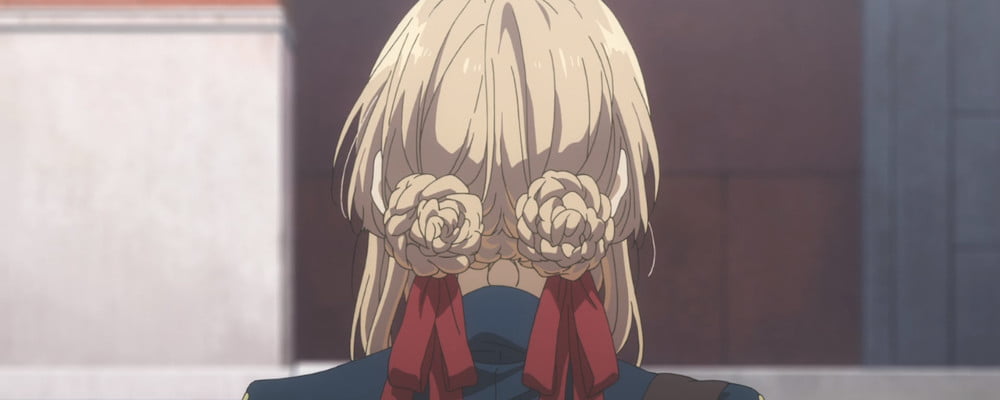
I wish to speak of Violet Evergarden.
And importantly, I want you to understand how this anime made me feel; what I thought of it; why I love it, even with the unpleasantness.
Nonetheless, a content warning for the series;
- this is a series that overwhelmingly features grief and tragedy, in very personal ways.
- There is parental bereavement,
- dead children,
- suicide attempts,
- a number of episodes show clear violence with guns.
- There is also a theme of age differences in romantic relationships, which while never sexualised (it’s kind of a sexless series), is still present in the series at several points and not exactly handled in a way that I would trust.
- This is a series where people cry a lot.
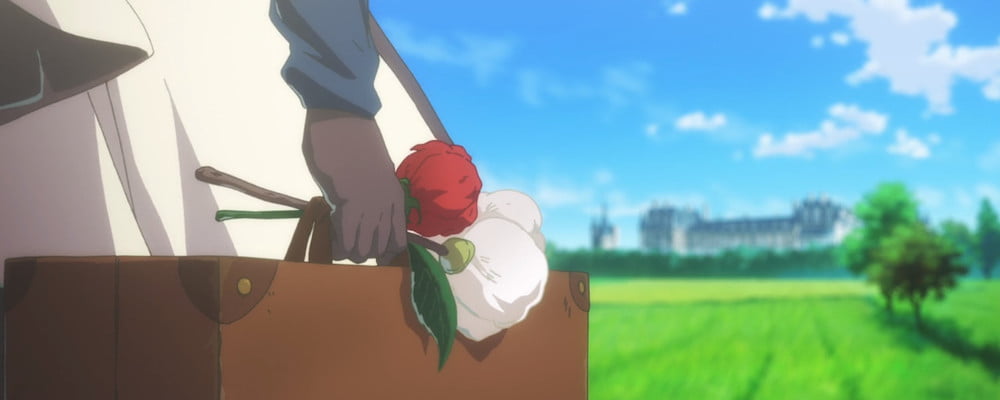
Part One: Eight Words
Violet Evergarden is a story about trying to understand people by enabling them to communicate with one another. It’s about being the person who doesn’t have a love letter of their own to write, who instead resolves to type up other people’s love letters. The series is a good, episodic watch, a set of discrete, contained stories that each try to address two out of three narrative tracks.
Track one is the big picture stuff. It’s a story of post-military reconstruction, about how you can see the way that the aftermath of a generational war has all these knock-on effects, about how many people lose things in a war that aren’t even lost on battlefields. Missing people, missing emotional stability, lost and destroyed farms, and yes, the number of soldiers suddenly adrift post-war with no saleable skill into a world that spent the bulk of their life raising them to fight. It’s also got knock on effects about how a bunch of people who were single and not thinking about changing that are kinda trying to address that now because, uh, being un-single is a good thing in a state that’s been beat up by war. It’s a pretty common background element for all the stories – showing Violet (and therefore the viewer) about how a long term full-scale multi-year war that happens actually at your borders in a connected state messes you up.
Track two is the individual stories about people communicating. It’s stories about the client of a job, or Violet’s coworker that is somehow related to a job. Almost every episode has this, this very distinct, ‘this is today’s job’ narrative. Solid stories, too, because this is about hiring a professional ghostwriter – in the literal sense, not the perjorative sense – in a period where not everyone is fully literate, and when a typewriter is a really specialised piece of hardware. It means you find people who are writing very important correspondence that merits the money, or trying to build something that lasts, or trying to speed up a very lengthy writing process – things that justify the expense of hiring someone in a desperate time. These are interesting short stories, and they’re typically very good. One that’s not, but we’ll get to that.
Track three is inside Violet’s head as she struggles with what we can summarise as ‘a lot,’ but it’s some combination of being a military superweapon they discovered accidentally, about the emotional trauma experienced doing that job, about the physical trauma of having lost both her arms, and needing some rehabilitative practice, and about answering the question she has about what it meant when her commanding officer died, telling her ‘I love you,’ (and some other stuff).
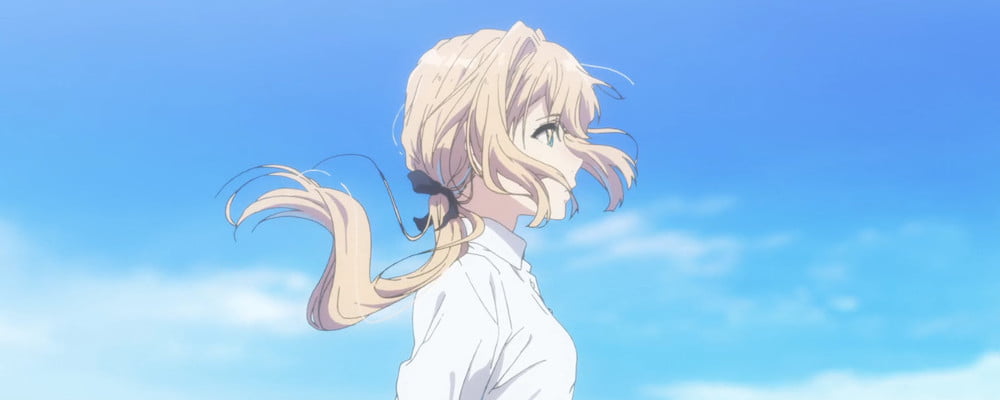
Each of these three tracks move along at their own rates, and with it we get a story that unfolds in a very deliberate way. I can understand people being annoyed at the presentation of this story where the knightly lady with the metal arms was depicted as capable of one-woman-armying her way through entire regiments of soldiers, only for that particular skillset to show up very rarely in the series itself, and for a lot of those appearances being flashbacks to the same moment we already know about.
I really enjoyed these ideas, though. I liked the way they could be set within one another. Violet needs to train to become a ghostwriter, but that involves understanding the other people who want to be ghostwriters and also it needs to understand the demand for ghostwriters. We see Violet start out bad at her job, then technically expert at her job, then as that expertise opens doors for her, how she handles the ensuing emotional problems she’s been trying to unpack through that job. It’s beautiful and it’s sweet and it’s very, very sad. It’s Typing And Crying, The Anime.
There are phrases that help crystallise important ideas for us. One of the reasons I think we accumulate poetry in our lives, phrases that mean a lot to us, or favourite books or favourite movies or videogames. They are the memes of our own personal 4chan, phrases that explain the way our inner life negotiates with itself, that we can try, desperately, to share with one another.
And, in Violet Evergarden, I heard – or read, through translation and its myriad fog, one more phrase of that type, one of those phrases that occupies my mind as I remember Violet looking at her metal hands and wondering about how they felt.
I did not know I was still burning.
It’s a phrase used only once or twice in the series – I only remember it once, but I can’t be sure it’s not repeated in reflection. And of course, it could be an artful english translation of another, different metaphor in Japanese. It’s a phrase that speaks to something that may seem alien to you, but resonated with me.
There’s this… state we get into in our own heads, where the way we live and think and experience the world is so absolutely and wholly our own that we naturally assume that how we experience that world is universal. And that gives us the mistaken belief, especially with trauma, that our responses to trauma are ‘not that big a deal.’
Doesn’t everyone have things like that?
Doesn’t everyone flash sweat when they hear a garage door open? Doesn’t everyone want to lash out, all the time? Doesn’t everyone want noisy music, loud enough to drown out that faint fuzzy sound that, of course, everyone gets?
When you start to understand that there are experiences you have that aren’t universal, and also are a sign that something is wrong, that something that you suffer and experience and assumed was inoperable, is something that you can address. That there is care for that, that there is, indeed, a salve to stop the burning, and that you are still burning.
I did not know I was still burning.
It’s this recognition of something in herself, that experience of herself, and … kinda the fact that she’s already talking aloud about the state of her mind, something that by default, people don’t do, because she’s exploring emotional communication that doesn’t make sense to her, that, again, by default, people don’t have to do, it paints the shape to me of a neurodivergent heroine, underneath that PTSD.
Part Two: Autistic Word Princess
I think Violet is neurodivergent.
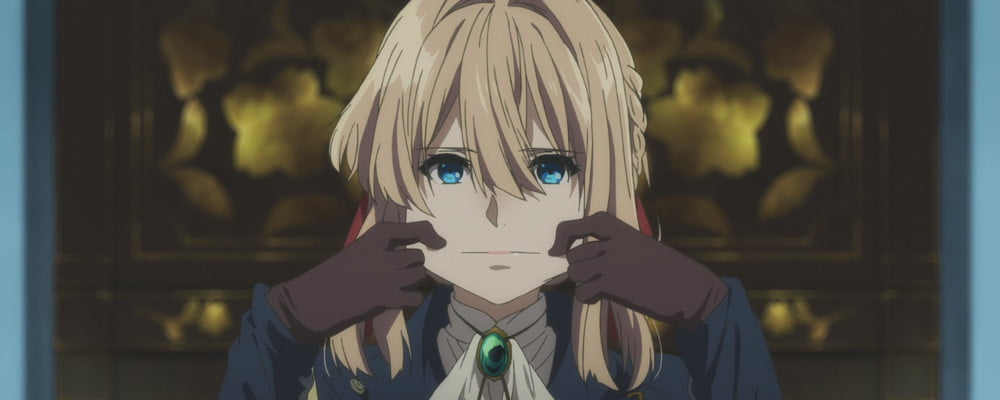
Before I go in on this though I guess I should disentangle exactly what I mean by that and how it pertains to Violet being traumatised, and how that may differ from being neurodivergent. This is simply going to be inexact because for a start, a variety of neurodivergences are expressed in different ways and a variety of modern understandings of neurodivergences may well be connected to a bunch of trauma responses, because our industrialised world has successfully made things suck for neurodivergent people that bad.
Yes, it is a legitimate position that ‘maybe most autistic people have been traumatised by the way we treat autistic people, and that’s why we think of these trauma symptoms as autism expressions.’ There’s an existing conversation about the codependence of sleep deprivation symptoms and ADHD symptoms, for example. It’s untidy.
We aren’t given much insight into a pre-trauma Violet. Everything we see of her is going to be focused through a lens of Post-Traumatic Stress Disorder (hence PTSD), where she is occasionally triggered into experiencing vivid flashbacks and nightmares of the experience of surviving a fight she did not want to survive. We never see a Violet who would not have or experience something traumatising and violent. With some background research in the books, it seems that not only was she regularly killing people who attempted to touch her inappropriately, she had been doing that since before she was recruited to the military. Any conversation about Violet’s mental state and processing is going to have to be filtered through the lens of recognising what is no doubt a variety of traumas.
Despite this, however, we do see her accommodating a society; a structure around her where she can recognise the value of other people and not see them as targets or impediments. I don’t think, therefore, that the rest of her behaviour – the ways she processes things like emotional language and information seem to not be related to her traumatised experience. PTSD has common effects on you – and while it’s a complicated thing to explain in simple summary, if a writer or storyteller wants to depict PTSD, it tends to be depicted in terms of things like reliving recurrent memories, distressing triggers that earn surprising emotional responses, and well, literal flashbacks.
(Which this series absolutely does).
When neurodivergence is discussed, though, PTSD and its related conditions isn’t really commonly part of the conversation. It’s definitely a mental health concern, and something that affects the way you live your life and interact with the world, often resulting in seemingly-odd behaviours and phobias, and it can definitely be represented as a sort of extreme shock that means you can’t communicate with people meaningfully any more, but it doesn’t tend to look like this. There are some traits that could be seen as autistic traits, but could just as easily be about her PTSD. For example, she dislikes loud and sudden sounds, which sure, that’s a common stimulation problem for autistic people, but also, it’s not uncommon for people with PTSD, especially if it’s caused by like, guns. She’s uncomfortable around fireworks, like, you know, explosives, so again.
I bring this up to make sure that I’m not just saying ‘hey, Violet’s obviously and uncomplicatedly an autistic character,’ and therefore I’m going to retro-fit all the details of her story onto that neurodivergence, look, representation is solved. It’s more complicated than that. Everything about her could be explained by PTSD, and it could also be more complex in its comorbidities.
The way she acts, therefore, is a way that resembles to me two common forms of neurodivergence I’ve seen discussed around me. One thing she can do is extremely efficient technical, rules-based, clear and clarified tasks with reliability and efficiency. She learns to touch type without any haptic feedback. There is an experience I’ve heard from a number of neurodivergent friends where any task school assigned them that could be dealt with by ‘throwing more mental energy at it’ would always work out great, but that kind of success will send them to educational positions where that kind of energy can’t get you the answers you need. The kind of student who tests well on mechanical or mathematical systems is very often the kind of student who is going to completely founder when you drop them into things like open creative solution spaces, or self-directed reading.
And that’s what happens to Violet. Perfect typing in response to input, complete helplessness when asked to do a creative task. This isn’t to say neurodivergence makes you uncreative – but when you train neurodivergent students to expect work to follow rules, giving them spaces without those rules or where those rules can seem arbitary can unmoor them.
We see Violet’s mind, and how she process information. We see her take a whole series to process the phrase I love you, and what that means. We see her teach herself to touch-type with hands she didn’t have a week ago. She is capable of fixating on things to the extent she doesn’t seem to notice other people and she is intense in her ability to perfectly replicate explicitly stated words from another person.
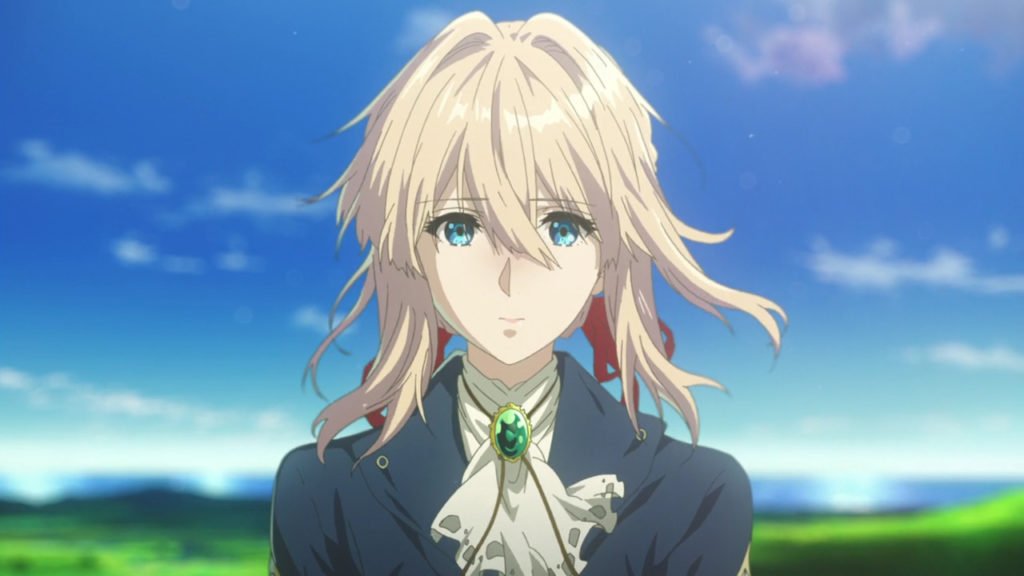
It’s always hard to say ‘this character is autistic’ in media. I think it’s very easy though to say that Violet Evergarden reads as autistic, if you’ve spoken to the kind of autistic people I have. And it isn’t just kind of ‘oh hey, that’s interesting, she’s autistic, oh well moving on.’ If you understand her experience as autism, it creates depth in these inexplicable situations.
A common scenario when I’m dealing with a student who’s either officially diagnosed, or who has been exploring the possibility and understanding their own minds is that when I give the faintest indication that I am willing to ask, talk, and understand the term, visibly demonstrates relief. Because suddenly they’re not having to unpack something from first principles with a stranger, but they’re dealing with someone who seems to at least not need them to justify why they think what they think about how they think. But I know that that experience is rare – so neurodivergent people of all stripes spend the majority of their time interacting with people who assume they aren’t neurodivergent and therefore interpret neurodivergent behaviour as neurotypical behaviour by an asshole and that means that time spent operating is this hypervigilant experience of trying to avoid blowups that could be explained if someone just understood and was willing to listen.
Which is what Violet spends her time travelling around doing.
Finding people to understand and listening to them.
That makes this a story about a traumatised autistic woman taking on a highly technical job as an exercise in learning about and understanding people around her and dismantling her own trauma. It’s a series full of moments where the passage of the scenes can feel like the show was asking me ‘hey, isn’t it obvious that people should be patient with Violet here? It’s weird how anyone would refuse to be patient with Violet in this moment,’ and then conspicuously show how useless it is to rush her, or show someone showing that patience and helping her overcome the problem.
Watching the series this way I felt a yearning to make life easier for Violet, if I could. The stories she moves through – each individual one a sad story, though usually structured around hope – are all stories where I could easily imagine a deft, careful mentor helping her to understand things… and then the story keeps reminding you she had a supposedly deft and careful mentor, who kinda sucked, and then…
I can’t help but think about the relationships in Violet Evergarden. That’s when things get sour.
Part Three: Of Course, Age Bullshit
Holy fucking crap can this anime please stop being weird about age gaps. Okay, I want to speed run this conversation to get to where I want to go:
- Yes, different cultures have different relationships to how they regard age gaps in relationships and what ranges are acceptable and normal and
- Yes, anime in general being unreal and representing young people as being much older than they are in terms of relationships and sexualities tends to make them hyper-real and that disconnects us from the fact that we’re being told these whole complex stories of sex gender love and romance are playing out with teenagers who are in many cases discovering their sexuality, not advanced and mature actors in that space, and
- Yes, anime fans are in general kind of very used to what we would consider ‘underaged stuff’ being one of the prices of admission and we do kind of route around it, where series that are otherwise not about some category of Sexy Child may in fact feature a Sexy Child, and
- Yes, we often try to think about this as a ‘weird’ thing and not something that anime as an industry courts and enables because it’s something that they consider normal and not actually something the industry in general considers to be something that at least parts of the audience respond to, and
- Yes, that’s led to a standard set of tropes in the entire anime genre that are about making excuses for these Sexy Child things, and
- Yes, then those tropes then show up in work that isn’t even necessarily about a sexual vibe, because it’s ‘normal’ and the net result is we wind up here, in Violet Evergarden and that is time.
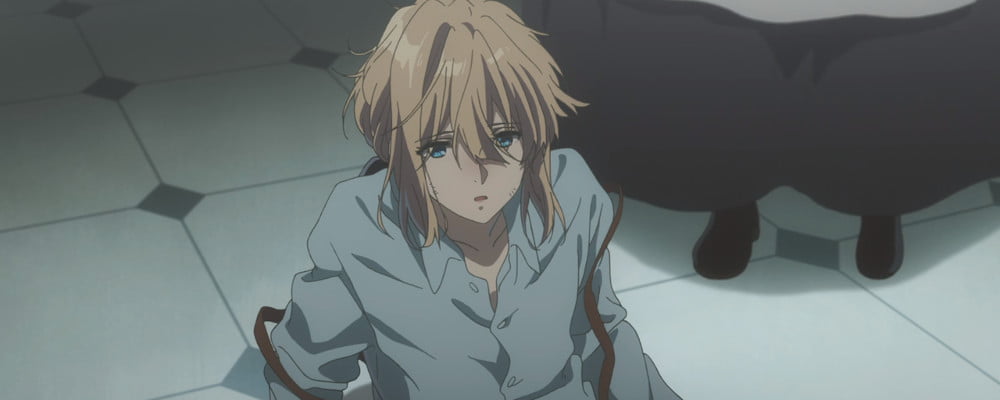
I’m not trying to forgive any part of this conversation, nor am I trying to fix it by making anyone feel bad about liking Dragon Maid or whatever. But it is also a conversation that can take a lot of time, and that time is often spent dismantling extremely loaded terms, a lot of content warning, and also, there’s a lot of time spent trying to prove something is the case as if it’s not evident to anyone particularly familiar with anime in any broad sense. Then you throw in the way that ‘It’s Japan’ can be used as a sort of get-out clause that lets you sidestep the conversation about ‘why do they do things that way?’ and yet is also necessary to cover some very reasonable things (like, yeah, people in Japan treat baths differently than they do here in Australia), which also involves unpacking orientalism and racism and honestly interesting different conversations about taboos and yet you will still have to end up at the question, as with the anime fans who want to have this argument:
Why do you keep bringing it up?
Let’s talk about specific examples. Episode 5 of Violet Evergarden, You Write Letters That Bring People Together? is a story about a princess’ betrothal. The princess is fourteen years old, and her targeted love interest is twenty four years old. Now you may think oh no, and you’d be right to do that, but I need you to hold on because it’s about to get worse.
See, the story reveals that the princess has in fact instigated the political movements to pursue this man and become betrothed to him. Which you know, that maybe paints the idea of this child as being, oh, say, precocious, and maybe aware of what she wanted and pursuing an older man, which yes, those are some very loud alarm bells, and then the story tries to explain why.
And it explains that she fell in love with him and resolved to marry him when they met at her birthday party.
Four years ago.
Now, look, a ten year age gap is not a problem in a relationship. It’s really not. There are a bunch of Floridian grandparents where one party is fifty five, one party is sixty five, it does not matter, and I do not care about that. Consenting adults can have their preferences. But this is not a story about a consenting adult, it’s a story about a ten year old child who is then represented as being capable of making elaborate political schemes to get what she wants and yes, this is just a big ole pile of yikes. And like, okay, you can go get into one of those arguments about it, but can we at least say, hey, please, maybe don’t start your age-gap romance plot when one of the agents in the narrative is ten.
And we route around it. Because I do think of this series well, even as I wrap this whole episode tightly in a plastic bag and drop it into the trash. I mean, I have an excuse, right? This is an anime-only episode, that means this anime decided to bring this idea up. This anime decided to add this story to the greater narrative.
Right?
Why do you keep bringing it up?
That’s one episode, though. It’s bad. It’s real bad. And what makes it worse is that as uncomfortable as this age gap narrative is, it’s replicating one of the recurrent themes in the whole story. Because Violet, of Violet Evergarden, is also apparently fourteen years old (which should earn a yell of what, fucking, really?), and her story where she murdered a bunch of dudes started when she was also ten and oh no, this episode is just making an individual point about a greater message of the story, because Violet’s whole driving arc of the series is trying to understand the dying words of her beloved who was ten years older than her.
And that means that this plot point will come up all the time and flashing back to times when she was in the military, which ended when she was fourteen, because she was being trained for four years alongside him which was when they fell in love.
There’s no routing around this. There’s faint hope, perhaps, that maybe it was a one-sided love; that Violet loved her superior officer in a romantic way she did not understand well (because she was a child) and he loved her as a parent or adopted sibling and the rest is just miscommunication or misunderstanding. There’s even room for an interesting story there, about the ways that we, ambiguously, communicate about these important issues and neurodivergent people are often caught in the unintentional gears of that machinery and get exploited. The story doesn’t go there, though, and instead spends multiple opportunities to drive home that this was a romantic relationship that neither fulfilled during their time, but eventually, after the series concludes and then there are books and then there’s a movie, they get married when she is eighteen and he is twenty nine. Like, the story isn’t unclear about that point, this dude who raised her from ten to fourteen becomes her husband when she’s eighteen.
And in this narrative? Sure, fine, like all the details of this narrative in this narrative work out and it’s not actually that essential. Which is part of the problem. None of this narrative is worse if the age gap was much smaller and none of it is worse if it just started later. If Violet was say, seventeen when they met, and he was eighteen, and he helped teach her how to be a soldier and so on, if all of those facts played out as they were nothing changes, and the story is just as emotionally resonant to me without needing to be reminded that this guy was her parent figure when she was ten.
The question returns:
Why do you keep bringing it up.
Conclusion
I wouldn’t say I enjoyed watching Violet Evergarden, because the experience was more sad and haunting, with tinges of hope, than it was enjoyable. I really did wish I got what I’d seen on the jar, as it were, with a story of this battle princess, with metal hands, coming to people, hearing their stories and maybe even fucking up baddies. Sort of like Leverage, but for a typist and with Fullmetal Alchemist hands.
What I got instead was very different; very awkward, in some ways, jagged in others. The ways it wanted to be painful were very real to me, they resonated and I felt overwhelmed at times with sadness for these characters, with a want for them to have and enjoy love. And at other times, it made me, for lack of a better word, cringe, as it kept returning to point out a fact that gets worse and worse the more intentional and thought-out it seems to be.
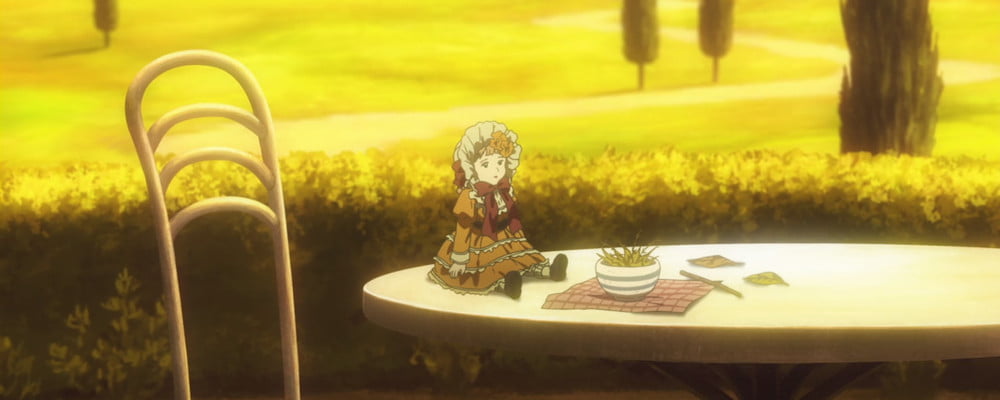
Violet Evergarden is a series that feels like it was made out of Favourite Series. If you told me it was your favourite anime I’d probably nod and go ‘hm, yeah.’ And I wouldn’t be thinking about age gaps or people treating an autistic character like an alien or the disappointment of not getting Saber The Librarian Kills Nazis, I’d be thinking about dancing across a lake and staring at hands and about a series of letters to a little girl as she stopped being a little girl.
And as I go on, I’ll mention the bad parts, because they need to be known, and I’ll praise the good parts, and enjoy this art that I like, and try, as best I can, to encourage more of it, but better.
I got some help checking the phrasing on some passages from Corey Terracotta.